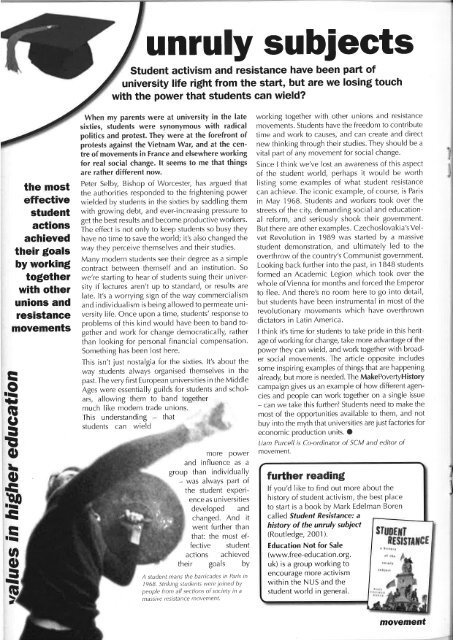Movement 124
You also want an ePaper? Increase the reach of your titles
YUMPU automatically turns print PDFs into web optimized ePapers that Google loves.
unruly subiects<br />
Student activism and resistance have been part of<br />
university life ri$ht from the start, but are we losing touch<br />
with the power that students can wield?<br />
the most<br />
effective<br />
student<br />
actions<br />
achieved<br />
their Eloals<br />
by workin$<br />
to$ether<br />
with other<br />
unions and<br />
resistance<br />
movements<br />
F t<br />
o rt<br />
U<br />
G(,<br />
-t<br />
E o \<br />
o<br />
-5<br />
!0<br />
rl-<br />
It<br />
\<br />
F t<br />
r<br />
ōo--<br />
\<br />
When my parents were at university in the late<br />
sixties, students were synonymous with radical<br />
politics and protest. They were at the forefront of<br />
protests against the Vietnam War, and at the centre<br />
of movements in France and elsewhere working<br />
for real social change. lt seems to me that things<br />
are rather different now.<br />
Peter Selby, Bishop of Worcester, has argued that<br />
the authorities responded to the frightening power<br />
wielded by students in the sixties by saddling them<br />
with growing debt, and ever-increasing pressure to<br />
get the best results and become productive workers.<br />
The effect is not only to keep students so busy they<br />
have no time to save the world; it's also changed the<br />
way they perceive themselves and their studies.<br />
Many modern students see their degree as a simple<br />
contract between themself and an institution. So<br />
we're starting to hear of students suing their university<br />
if lectures aren't up to standard, or results are<br />
late. It's a worrying sign of the way commercialism<br />
and individualism is being allowed to permeate university<br />
life. Once upon a time, students' response to<br />
problems of this kind would have been to band together<br />
and work for change democratically, rather<br />
than looking for personal financial compensation.<br />
Something has been lost here.<br />
This isn't just nostalgia for the sixties. lt's about the<br />
way students always organised themselves in the<br />
past. The very first European universities in the Middle<br />
Ages were essentially guilds for students and scholars,<br />
allowing them to band<br />
much like modern trade unio<br />
This understanding<br />
students can wield<br />
a<br />
lTr<br />
i<br />
I<br />
that<br />
.,t<br />
l*<br />
it tF<br />
.,<br />
more power<br />
and influence as a<br />
group than individually<br />
- was always part of<br />
the student experience<br />
as universities<br />
developed and<br />
changed. And it<br />
went further than<br />
that: the most effective<br />
student<br />
actions achieved<br />
their goals by<br />
A student mans the barricades in Paris in<br />
1968. Striking students were ioined by<br />
people from all sections of sociely in a<br />
m ass ive reslstance move m e n t.<br />
working together with other unions and resistance<br />
movements. Students have the freedom to contribute<br />
time and work to caLrses, and can create and direct<br />
new thinking through their studies. They should be a<br />
vital part of any movement for social change.<br />
Since I think we've lost an awareness of this aspect<br />
of the student world, perhaps it would be worth<br />
listing some examples of what student resistance<br />
can achieve. The iconic example, of course, is Paris<br />
in May 1968. Students and workers took over the<br />
streets of the city, demanding social and educational<br />
reform, and seriously shook their government.<br />
But there are other examples. Czechoslovakia's Velvet<br />
Revolution in 1989 was started by a massive<br />
student demonstration, and ultimately led to the<br />
overthrow of the country's Communist government.<br />
Looking back further into the past, in 1B4B students<br />
formed an Academic Legion which took over the<br />
whole of Vienna for months and forced the Emperor<br />
to flee. And there's no room here to go into detail,<br />
but students have been instrumental in most of the<br />
revolutionary movements which have overthrown<br />
dictators in Latin America.<br />
I think it's time for students to take pride in this heritage<br />
of working for change, take more advantage of the<br />
power they can wield, and work together with broader<br />
social movements. The article opposite includes<br />
some inspiring examples of things that are happening<br />
already, but more is needed. The MakePovertyHistory<br />
campaign gives us an example of how different agencies<br />
and people can work together on a single issue<br />
- can we take this further? Students need to make the<br />
most of the opportunities available to them, and not<br />
buy into the myth that universities are just factories for<br />
economic production units. O<br />
Liam Purcell is Co-ordinator of SCM and editor of<br />
movement.<br />
further readin$<br />
lf you'd like to find out more about the<br />
history of student activism, the best place<br />
to start is a book by Mark Edelman Boren<br />
called Student Resisfance.' a<br />
history of the unruly subject<br />
(Routledge, 2001).<br />
Education Not for Sale<br />
(www.free-ed ucati on.org.<br />
uk) is a group working to<br />
encourage more activism<br />
within the NUS and the<br />
student world in general.<br />
srlnrff<br />
tt$snmt<br />
movement

















